Overview
The article titled "10 Essential JavaScript Debugging Tools for Developers" begins by addressing the coding challenges developers often encounter. These challenges can hinder productivity and the quality of software. However, various tools are available to help overcome these obstacles. For instance, Chrome DevTools, Visual Studio Code, and Sentry each offer unique features that enhance the debugging process.
By utilizing these tools, developers can significantly improve their troubleshooting efficiency. Chrome DevTools provides a robust environment for inspecting elements and monitoring performance, while Visual Studio Code offers integrated debugging capabilities that streamline the coding experience. Sentry, on the other hand, excels in error tracking, allowing developers to quickly identify and resolve issues in real-time.
The benefits of employing these tools extend beyond mere troubleshooting; they empower developers to maintain high standards of software quality. With improved productivity, developers can focus on writing better code rather than getting lost in debugging. This ultimately leads to a more efficient development process and a higher quality end product.
In conclusion, exploring the essential JavaScript debugging tools can transform the way developers approach their work. By leveraging these resources, developers can not only tackle common coding challenges but also enhance their overall coding practices. Are you ready to elevate your debugging process? Consider integrating these tools into your workflow for a more effective coding experience.
Introduction
In the ever-evolving landscape of software development, developers often grapple with complex coding challenges that can hinder productivity and code quality. How can these challenges be effectively addressed? Kodezi emerges as a powerful ally, offering automated debugging capabilities that streamline the troubleshooting process. With robust features that enhance efficiency, Kodezi empowers developers to focus on what truly matters: innovation.
Furthermore, the benefits of utilizing Kodezi are significant. By integrating its debugging tools into their workflow, developers can expect improved productivity and a marked increase in code quality. This not only alleviates the stress associated with debugging but also fosters a more creative environment for development.
As the demand for high-quality applications continues to rise, understanding and leveraging tools like Kodezi is crucial for success in today's competitive tech environment. Are you ready to explore the tools available on the platform and transform your coding practices?
Kodezi | Professional OpenAPI Specification Generator - AI Dev-Tool: Automated Code Debugging
Coding challenges can often impede a developer's progress. Kodezi offers a state-of-the-art automated software troubleshooting tool that swiftly detects and resolves issues within your programming repository. This innovative feature not only accelerates the troubleshooting process but also provides comprehensive explanations of errors, enabling programmers to grasp the root causes of their challenges. By utilizing Kodezi, developers can uphold high standards of quality, allowing them to concentrate on crafting solutions rather than grappling with javascript debugging tools. Furthermore, Kodezi's integration with the OpenAPI Specification Generator significantly enhances its value for programmers working with APIs, ensuring that their code consistently meets professional standards. The Kodezi CLI acts as a versatile asset for teams, autonomously refining codebases and addressing problems before they escalate to production. This capability empowers engineering teams to boost programming productivity and streamline their workflows.
Recent statistics reveal that a growing number of programmers are turning to automated error-checking solutions, with over 51,741 responses highlighting the increasing interest in YAML language server integration. This trend underscores the importance of interactive troubleshooting, as emphasized by Microsoft Research, which advocates for utilizing javascript debugging tools to elevate coding efficiency. Kodezi distinguishes itself in this landscape by equipping programmers to enhance both productivity and code quality effectively. Why not explore the tools available on the platform and see how they can transform your coding experience?
Chrome DevTools: Comprehensive Browser Debugging Suite
Developers often face significant challenges when coding, which can include using JavaScript debugging tools to address debugging issues and optimize performance. Chrome DevTools stands out as an indispensable suite of web developer tools integrated into the Google Chrome browser, designed to address these challenges effectively. Offering a robust array of features for inspecting HTML and CSS, utilizing JavaScript debugging tools for debugging JavaScript, and analyzing performance, it empowers developers to tackle their coding hurdles with confidence.
Developers can efficiently use JavaScript debugging tools like Chrome DevTools to set breakpoints, view console logs, and monitor network activity, facilitating real-time issue identification and resolution. Recent updates have introduced enhanced performance metrics, allowing creators to monitor improvements in metrics such as Interaction to Next Paint (INP). These enhancements are particularly noteworthy, as they have shown significant improvements after applying fixes. Furthermore, the user interface has been improved, making navigation more intuitive and the troubleshooting process more streamlined.
In addition, the Performance panel now includes options to record runtime performance, load performance, capture screenshots, and manage garbage collection. This comprehensive toolkit offers developers the necessary JavaScript debugging tools to optimize their applications effectively. Users can also clear the CSS selector stats by adjusting settings in the Performance panel, which enhances usability and fosters a more efficient workflow.
As Zoher Ghadyali from the Microsoft Edge Team noted, "Portions of this page are modifications based on work created and shared by Microsoft and used according to terms described in the Creative Commons Attribution 4.0 International License." This acknowledgment underscores the effectiveness of JavaScript debugging tools like Chrome DevTools in modern web development, making them vital resources for developers looking to enhance their productivity and code quality.
Visual Studio Code: Integrated Debugging Environment
In the world of coding, developers often encounter significant challenges, particularly when utilizing JavaScript debugging tools to debug their applications. Visual Studio Code (VS Code) emerges as a powerful text editor, celebrated for its built-in JavaScript debugging tools and troubleshooting features tailored for JavaScript and various programming languages. Developers can effortlessly set breakpoints, inspect variables, and step through code execution, all within a user-friendly interface. Furthermore, the versatility of VS Code is amplified by its extensive library of extensions, including JavaScript debugging tools, allowing seamless integration with various frameworks to cater to diverse development workflows.
As we look ahead to 2025, VS Code's troubleshooting capabilities continue to evolve, enhancing its appeal among programmers. The integrated terminal and Git functionality, combined with JavaScript debugging tools, enhance version management and command execution, making it an essential tool for effective troubleshooting. A recent survey revealed that 73% of developers favor VS Code for its robust troubleshooting environment, underscoring its widespread adoption in the programming community.
Real-world examples illustrate the effectiveness of VS Code along with JavaScript debugging tools in troubleshooting JavaScript applications. Developers have reported increased productivity and reduced troubleshooting time, thanks to the intuitive interface and powerful features. As frontend engineer Sylwia Wajgel aptly notes, "Choosing an operating system for web development is totally a matter of preferences and budget," which emphasizes the importance of selecting the right tools in the development process. This sentiment resonates with many who have made VS Code their preferred environment.
Expert opinions further reinforce the value of VS Code as a troubleshooting environment. Numerous programmers highlight that JavaScript debugging tools, along with its integrated features, not only simplify the troubleshooting process but also enhance code quality and accelerate development cycles. With ongoing updates and enhancements, including improved support for WSL2—enabling programmers to operate smoothly in mixed environments—VS Code remains a top choice for those seeking to elevate their troubleshooting experience. The latest updates for 2025 further solidify its status as a prominent resource in the programming community.
Node.js Inspector: Real-Time Debugging for Node Applications
Developers often face significant challenges during debugging, which can be mitigated by using JavaScript debugging tools. Node.js Inspector serves as a powerful tool that allows programmers to debug Node.js applications in real-time. By executing Node.js with the --inspect flag, developers can effortlessly connect to the Inspector via Chrome DevTools, enabling them to set breakpoints, step through scripts, and inspect variables. These features are essential for diagnosing performance bottlenecks and untangling complex server-side logic, while the updates to Node.js Inspector in 2025 have further refined its troubleshooting capabilities, enhancing its utility as one of the important JavaScript debugging tools in identifying performance issues and ensuring compliance with the latest security best practices. Developers have reported that utilizing JavaScript debugging tools significantly reduces the time spent on troubleshooting. Many suggest it simplifies their error-checking process, ultimately improving software quality.
As Saisuman Revankar noted, 'Node.js has made significant progress in this area with its callback capabilities and event-driven structure,' highlighting the importance of efficient troubleshooting resources. Furthermore, with Node.js achieving an impressive 1 billion downloads in 2018 and an estimated 1 million downloads occurring daily, the relevance of Node.js Inspector is further emphasized.
Case studies reveal that Node.js users dedicate an average of 51% of their total development time within the runtime environment. This statistic underscores the essential role of JavaScript debugging tools, such as Node.js Inspector, in facilitating effective troubleshooting practices and enhancing overall code performance. Are you ready to explore how such tools can transform your development experience?
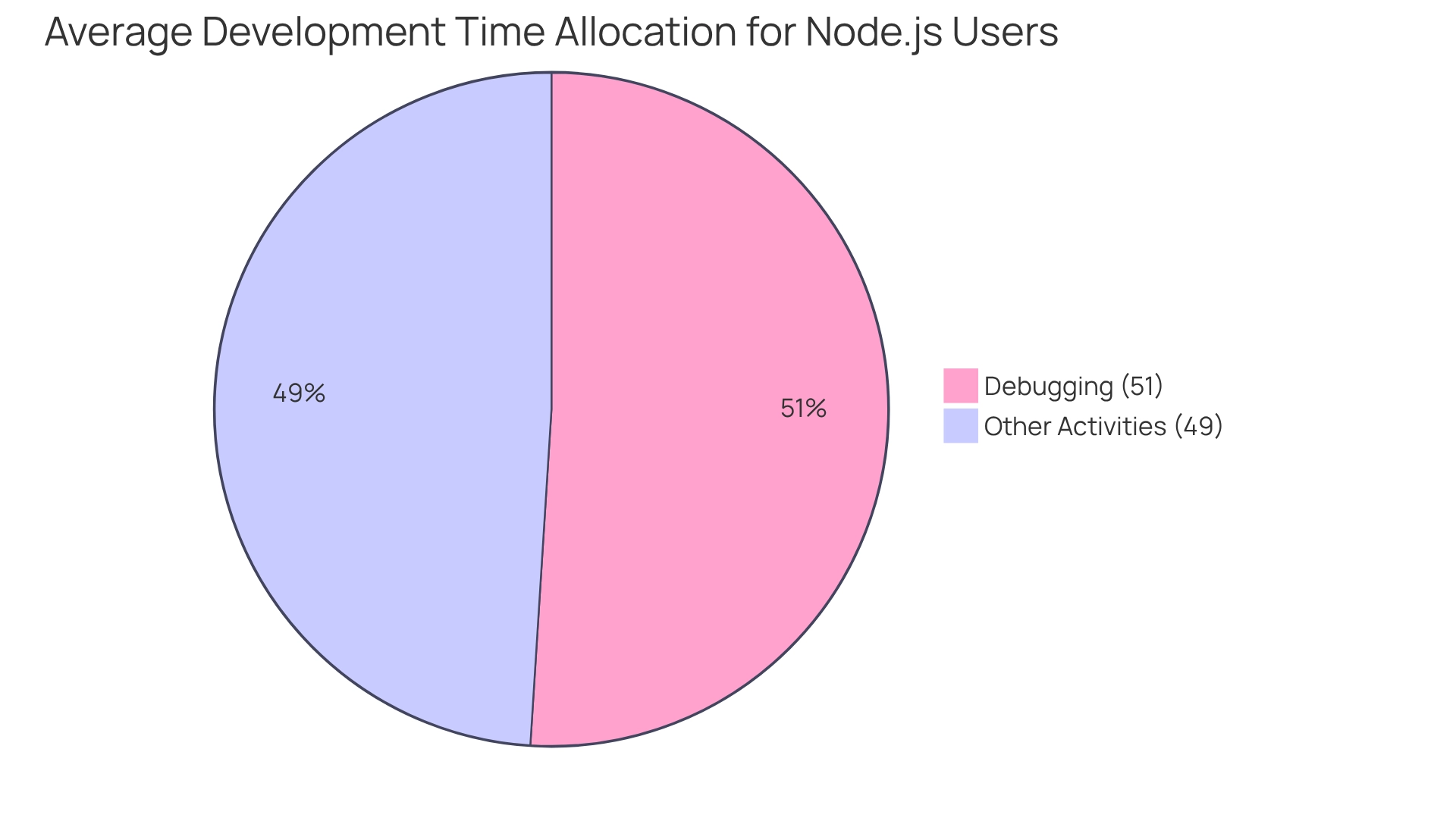
Firebug Lite: Lightweight Debugging for Browsers
Developers often face significant challenges when using JavaScript debugging tools to debug their code, especially in a fast-paced environment. Firebug Lite emerges as a streamlined solution, optimized for use across any browser. This lightweight tool offers essential features such as:
- HTML element inspection
- Network activity monitoring
- JavaScript analysis
Making it an invaluable resource for programmers seeking effective troubleshooting without the complexity of a full browser extension, showcasing its role as one of the preferred JavaScript debugging tools in the shift towards lightweight debugging applications like Firebug Lite. Many developers favor these tools for their simplicity and speed. Recent statistics indicate a considerable rise in the utilization of such resources, showcasing a trend towards solutions that not only enhance software quality but also improve the end-user experience. Real-world examples illustrate how Firebug Lite, as one of the JavaScript debugging tools, facilitates quick troubleshooting, enabling developers to resolve issues efficiently and elevate the overall quality of their web applications.
As we look ahead to 2025, Firebug Lite continues to adapt, incorporating features that meet modern development demands. Developers appreciate its capacity to provide immediate feedback and insights, solidifying its status as a preferred choice for those who prioritize efficiency. Expert opinions highlight the effectiveness of lightweight troubleshooting resources, noting their correlation with increased productivity and enhanced user experiences. For instance, a case study on Google Chrome DevTools reveals how JavaScript debugging tools enable rapid editing and troubleshooting of web pages, ultimately leading to the creation and launch of superior websites.
In summary, Firebug Lite exemplifies the many advantages of lightweight JavaScript debugging tools. It provides a practical solution for web creators who require fast and effective resources to streamline their workflow. Why not explore how Firebug Lite can enhance your development process today?
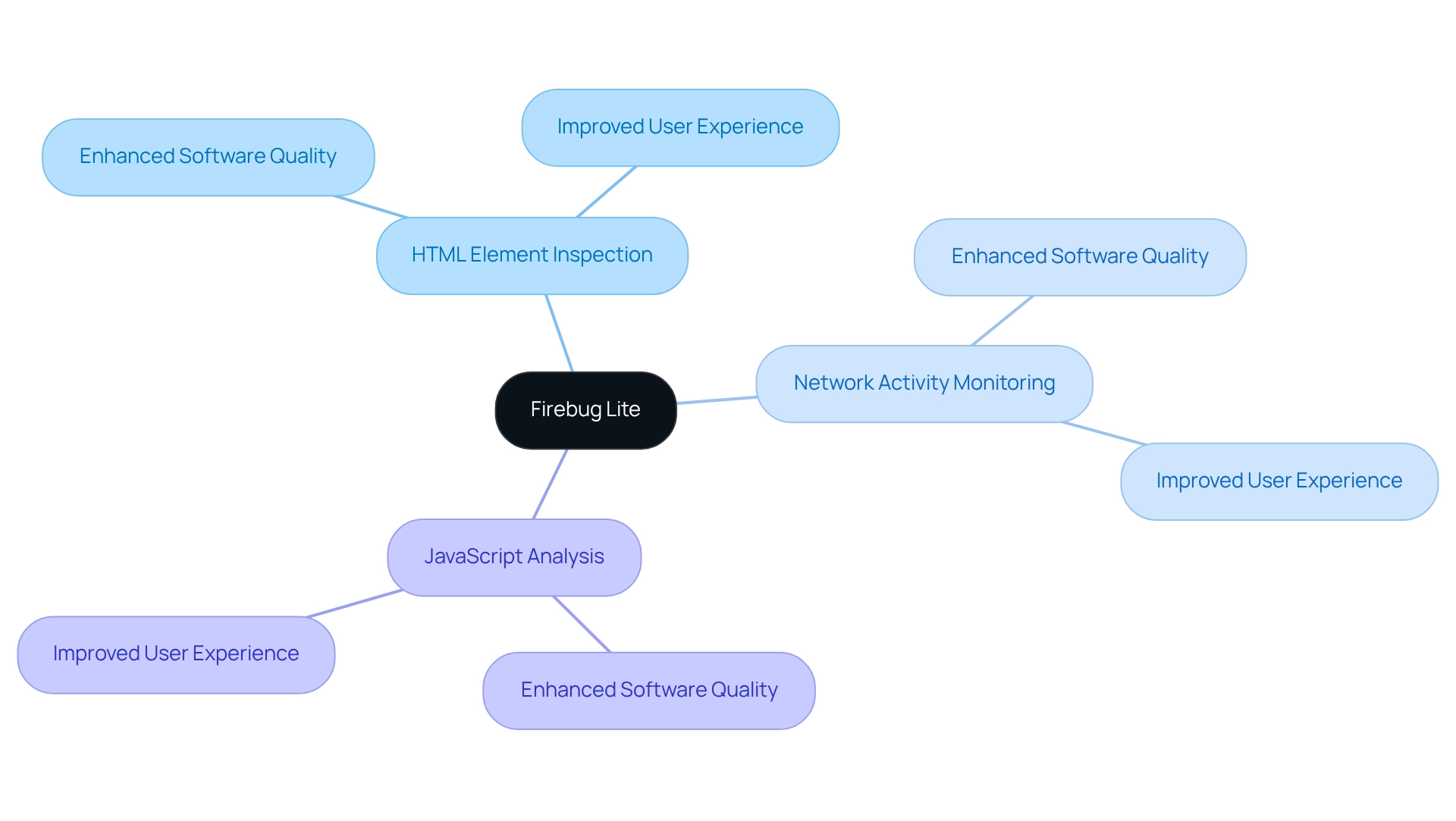
Sentry: Real-Time Error Tracking and Monitoring
Coding challenges can often hinder developers' productivity and the overall quality of applications. Sentry serves as an application performance monitoring solution that addresses these issues by offering real-time error tracking and oversight. It automatically captures errors and performance problems, enabling developers to quickly trace the root causes of issues. With detailed stack traces and contextual information about errors, Sentry empowers teams to prioritize and resolve problems efficiently, leading to a smoother user experience and enhanced application reliability.
In addition, incorporating JavaScript debugging tools along with automated software troubleshooting tools such as Kodezi can significantly improve the development process. Kodezi quickly detects and resolves codebase problems, optimizes performance by addressing bottlenecks, locates security flaws, adds exception handling, and refines formatting. The use of JavaScript debugging tools not only accelerates issue resolution but also enhances overall code quality. Have you considered how such tools could fit into your agile development workflows?
By utilizing Kodezi, developers can experience improved productivity and code quality. The platform's features streamline troubleshooting and enhance collaboration among team members. Furthermore, the integration of Sentry with Kodezi allows for a comprehensive approach to application performance, ensuring that developers can focus on what matters most—delivering high-quality software. Explore the tools available on the platform to see how they can transform your coding practices.
Jest: Testing Framework with Built-In Debugging
In the fast-paced world of software development, coding challenges can often feel overwhelming. Jest emerges as a premier JavaScript testing framework, renowned for its JavaScript debugging tools and built-in debugging capabilities. This framework empowers developers to execute tests in debug mode, allowing them to set breakpoints and inspect application states during test execution. Such functionality is invaluable for pinpointing issues in unit tests and verifying that code performs as intended with JavaScript debugging tools.
With 80% of users abandoning applications that take longer than three seconds to load, the importance of efficient debugging using JavaScript debugging tools cannot be overstated. The user-friendly interface of Jest, marked by its intuitive setup and clear error messages, along with thorough documentation that contains examples and best practices, enables smooth integration into existing workflows. This makes it a preferred option among programmers.
Recent statistics indicate that Jest has been adopted by more than 70% of JavaScript programmers, underscoring its effectiveness in enhancing code quality. Furthermore, organizations utilizing cloud-based testing environments alongside Jest report a remarkable 60% reduction in feedback time, showcasing the framework's role in improving overall testing efficiency, while real-world instances demonstrate how programmers use JavaScript debugging tools in Jest to enhance their testing procedures.
As one programmer observed, 'Automated testing has become a necessity in contemporary software development.' Isn't it too risky to rely solely on manual testing when you have tight deadlines to meet? This sentiment reflects the growing consensus on the critical role of integrated error correction in maintaining high-quality code. Additionally, effective testing requires critical thinking and analytical skills, which are essential for interpreting results and making informed decisions.
With ongoing updates in 2025, including improvements to its troubleshooting features and support for new JavaScript capabilities, Jest continues to evolve, reinforcing its status as a vital resource for programmers dedicated to excellence in their coding practices.
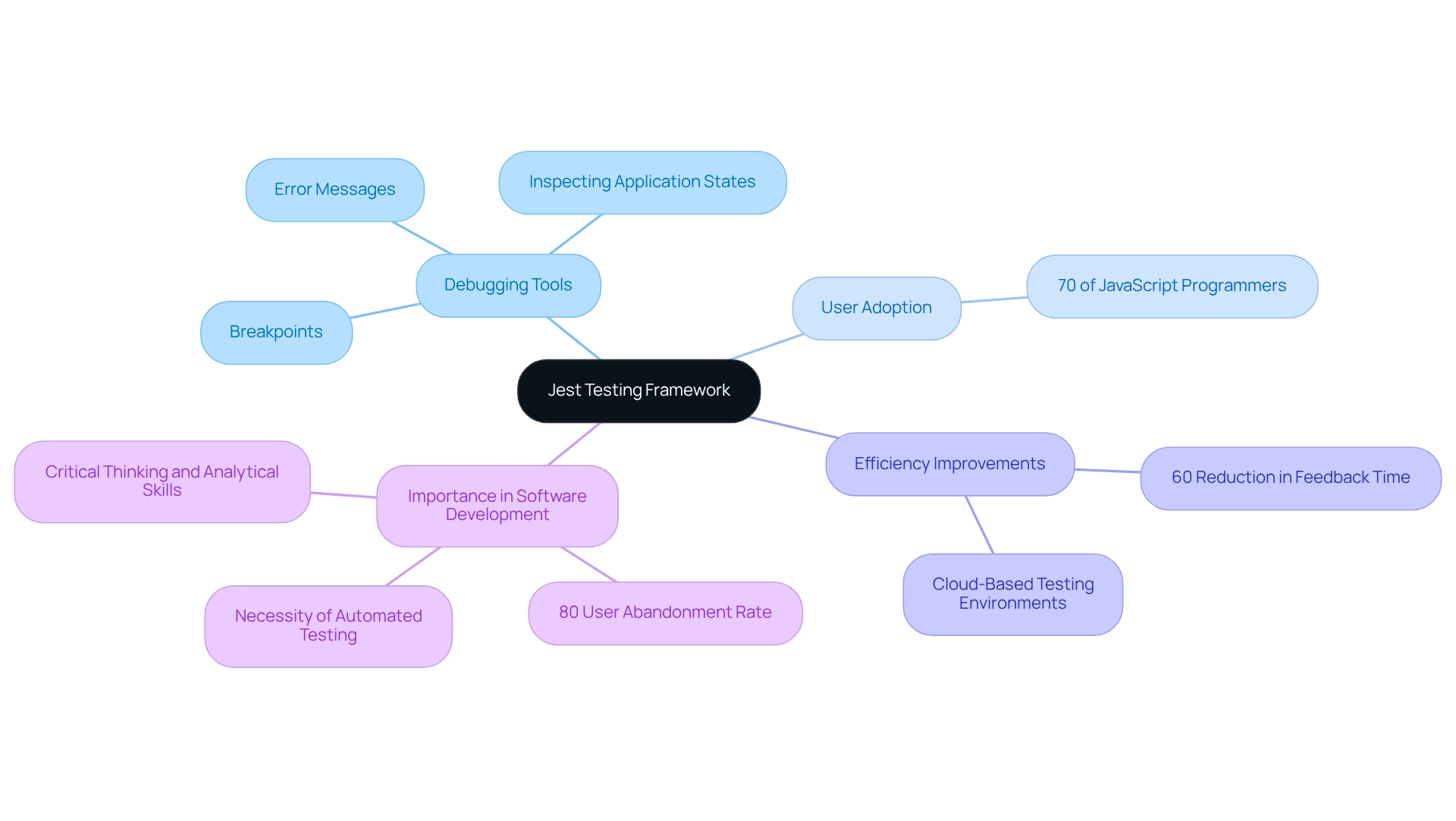
WebStorm: Advanced IDE for JavaScript Debugging
Developers often face significant coding challenges, particularly when it comes to debugging and maintaining code quality. WebStorm stands out as a sophisticated integrated development environment (IDE) specifically designed for JavaScript and TypeScript development. It features a comprehensive range of JavaScript debugging tools, such as the ability to set breakpoints, examine variables, and assess expressions in real-time, greatly simplifying the debugging process. With intelligent code completion and advanced refactoring capabilities, WebStorm enables programmers to maintain clean and efficient code effortlessly. Furthermore, its seamless integration with version control systems enhances collaborative development, making it a vital resource for creating scalable development teams in dynamic tech environments.
However, while WebStorm's user base is around 10%, indicating a committed community that appreciates its strong features, some individuals may be hesitant to adopt it due to its subscription model. This statistic highlights the importance of weighing the advantages of WebStorm's advanced troubleshooting features against the subscription cost.
As of 2025, continuous updates keep improving its troubleshooting tools, ensuring that programmers have access to the latest enhancements for an optimized coding experience. For instance, a recent case study comparing popular code editors for MERN stack development revealed that WebStorm's extensive plugin marketplace and built-in Git support make it a preferred option among developers. This further reinforces its status as a top-tier IDE for JavaScript debugging tools. To maximize the advantages of WebStorm and its JavaScript debugging tools, developers are encouraged to explore its collaborative features, utilize its intelligent code completion for quicker coding, and regularly update to the latest version to take advantage of new troubleshooting enhancements. Additionally, consider checking out Kodezi's free trial to improve your JavaScript troubleshooting skills today! Why not try Kodezi alongside WebStorm for a thorough troubleshooting experience?
Fiddler: Web Debugging Proxy for HTTP Traffic Inspection
In the realm of web development, coding challenges are a common hurdle that developers face. Fiddler serves as a powerful web analysis proxy, capturing, inspecting, and modifying HTTP and HTTPS traffic between your computer and the internet. This essential tool allows programmers to examine requests and responses, aiding in the detection of network communication problems. With its capability to simulate various network conditions and inspect traffic in real-time, Fiddler proves invaluable for debugging web applications with JavaScript debugging tools and optimizing performance.
Statistics reveal that a substantial proportion of web creators employ Fiddler for HTTP traffic analysis, underscoring its significance in the development community. Developers frequently emphasize the necessity of HTTP traffic inspection, noting that it is crucial for diagnosing issues that can hinder application performance. As Mohamed Saad aptly states, "A successful website does three things: It attracts the right kinds of visitors, guides them to the main services or products you offer, and collects contact details for future ongoing relations." This highlights how tools like Fiddler contribute to the success of web applications by ensuring they function optimally.
Fiddler's features include the ability to view and modify HTTP requests and responses, set breakpoints, and inspect traffic through a user-friendly interface. These functionalities enable programmers to swiftly and effectively identify issues using JavaScript debugging tools. Furthermore, the updates in 2025 have further enhanced Fiddler's capabilities, making it even more adept at identifying network issues and improving overall application performance. Notably, these updates feature enhanced user interface components and sophisticated troubleshooting capabilities that optimize the workflow for programmers.
Real-world examples illustrate how effective HTTP traffic inspection can lead to significant improvements in web applications. For instance, developers have reported that using Fiddler helped them uncover hidden bugs and optimize load times, resulting in a better user experience. Expert opinions consistently emphasize Fiddler's role as a prominent web analysis proxy, with many professionals recommending its use in any serious web development toolkit. Steve Krug's insights on web design highlight that there are no straightforward solutions to web design inquiries, promoting thoroughly considered and tested integrated designs, which resources like Fiddler support.
In summary, Fiddler is one of the JavaScript debugging tools that not only streamlines the troubleshooting process but also enables programmers to build more resilient and efficient web applications. By leveraging its features, developers can significantly enhance their productivity and the quality of their code, making Fiddler an essential resource in the modern programmer's arsenal.
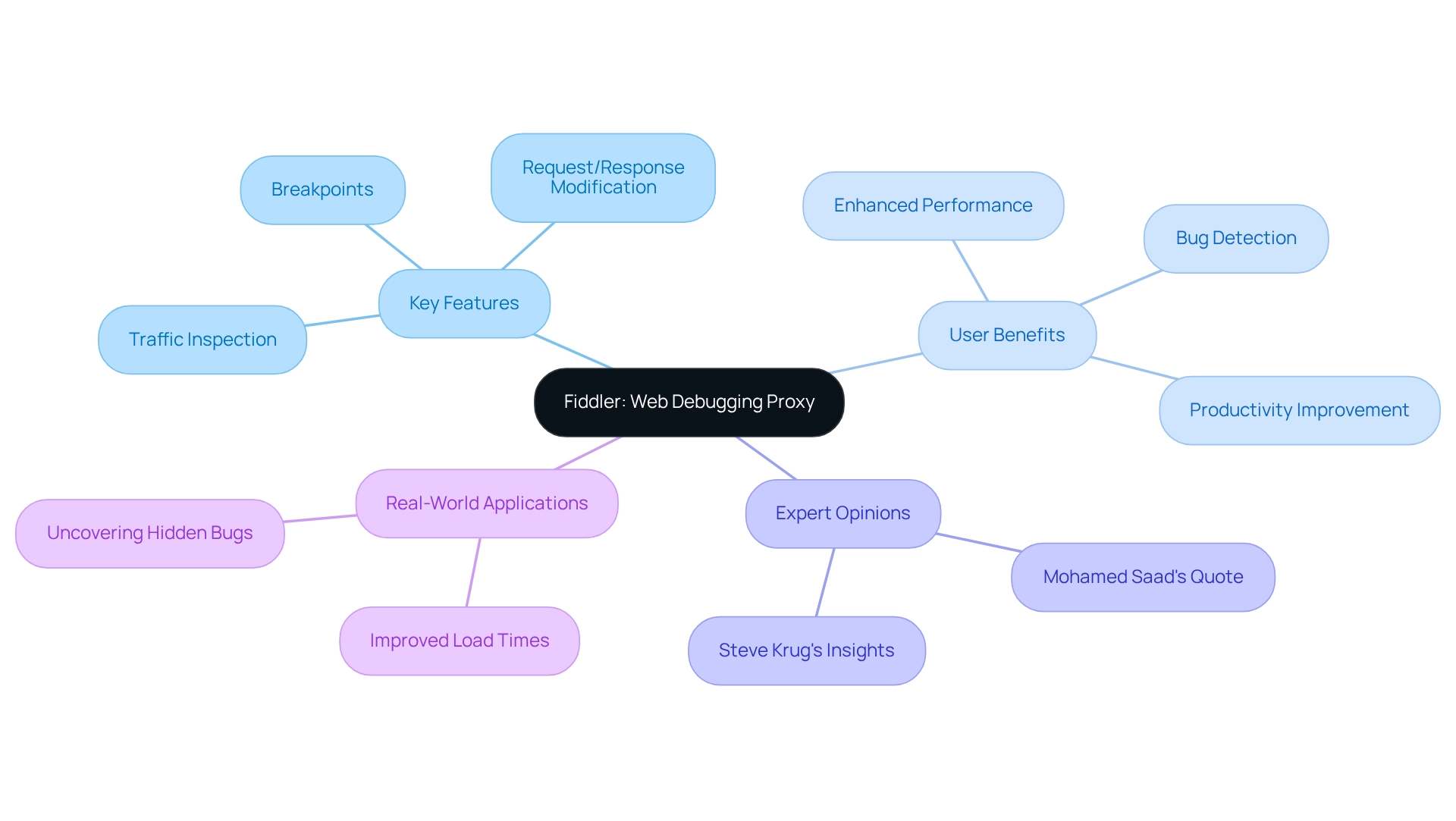
Postman: API Testing Tool with Debugging Features
Developers often encounter significant challenges when it comes to coding and API management. Postman stands out as a robust API testing tool, offering an intuitive interface for designing, testing, and troubleshooting APIs. Its built-in console allows for straightforward inspection of requests and responses, enabling quick identification of issues during the development process. Furthermore, with features like automated testing and monitoring, Postman ensures that APIs are not only reliable but also perform optimally in real-world scenarios.
In addition, to enhance the troubleshooting process, programmers can leverage Kodezi. This tool provides automated code analysis, allowing for the rapid identification and resolution of codebase issues. Kodezi's capabilities include fixing performance bottlenecks, uncovering security vulnerabilities, and ensuring compliance with the latest coding standards. By integrating Kodezi with Postman, developers can optimize their workflows and maintain high standards of development efficiency and reliability in the evolving API landscape.
Imagine the productivity gains when developers can focus more on coding rather than debugging. By using Kodezi alongside Postman, teams can significantly streamline their automated testing and utilize JavaScript debugging tools in their debugging processes. This not only enhances code quality but also fosters a more efficient development cycle. Are you ready to explore the tools available on the platform that can elevate your coding practices? Embrace these solutions and transform your development experience.
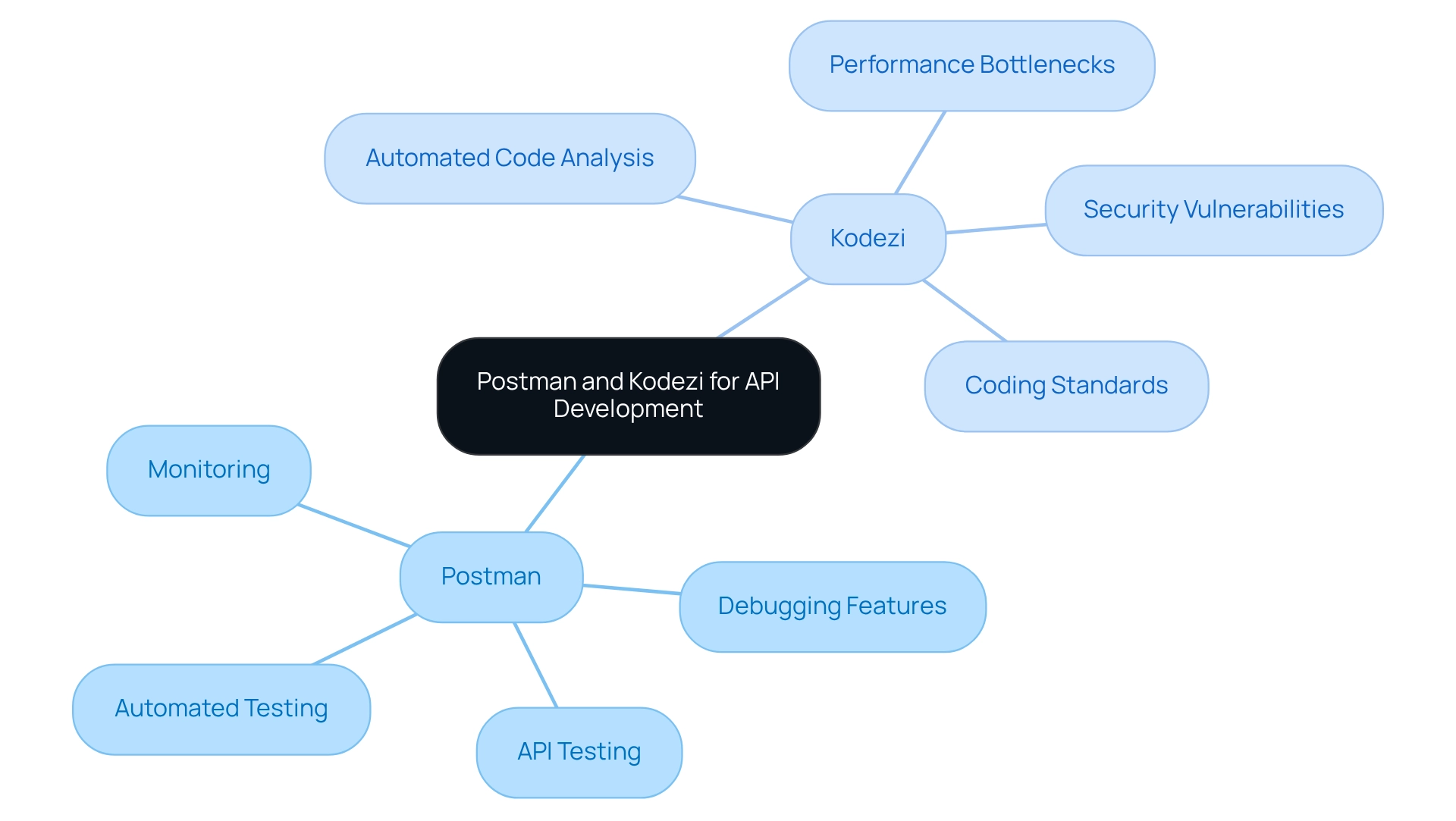
Conclusion
In the fast-paced world of software development, developers face numerous coding challenges that can hinder their progress. Kodezi emerges as a vital resource, addressing these challenges with its automated debugging capabilities that enhance productivity and code quality. By streamlining the troubleshooting process, Kodezi allows developers to focus on innovation rather than getting bogged down by technical issues. The integration of such tools into development workflows is essential, especially as the demand for high-quality applications continues to rise.
Furthermore, alongside Kodezi, other powerful debugging solutions like:
- Chrome DevTools
- Visual Studio Code
- Node.js Inspector
- Postman
significantly contribute to the development ecosystem. Each tool offers unique features tailored to specific programming needs, from real-time debugging to comprehensive performance analysis. The growing adoption of these tools among developers points to a clear trend: the need for efficient, user-friendly solutions that not only simplify the debugging process but also enhance overall code quality.
Ultimately, embracing advanced debugging tools is crucial for developers aiming to optimize their workflows and deliver superior applications. As the technology landscape evolves, leveraging the right tools will be key to navigating coding challenges and achieving success in a competitive environment. The path to innovation lies in the hands of those equipped with the best resources—now is the time to explore and implement these tools for a more effective development experience.
Frequently Asked Questions
What is Kodezi and how does it assist developers?
Kodezi is an automated software troubleshooting tool that quickly detects and resolves issues within programming repositories. It accelerates the troubleshooting process and provides comprehensive explanations of errors, helping programmers understand the root causes of their challenges.
How does Kodezi enhance coding quality and productivity?
By using Kodezi, developers can maintain high standards of quality, allowing them to focus on crafting solutions instead of dealing with debugging tools. Its integration with the OpenAPI Specification Generator also helps ensure that code meets professional standards consistently.
What role does Kodezi CLI play for development teams?
The Kodezi CLI acts as a versatile asset for teams by autonomously refining codebases and addressing issues before they escalate to production, thereby boosting programming productivity and streamlining workflows.
What recent trends indicate the popularity of automated error-checking solutions?
Recent statistics show a growing interest in automated error-checking solutions, with over 51,741 responses highlighting the increasing focus on YAML language server integration. This trend emphasizes the importance of interactive troubleshooting.
How does Chrome DevTools assist developers in debugging?
Chrome DevTools is a suite of web developer tools integrated into the Google Chrome browser, providing features for inspecting HTML and CSS, debugging JavaScript, and analyzing performance. It allows developers to set breakpoints, view console logs, and monitor network activity for real-time issue resolution.
What new features have been added to Chrome DevTools?
Recent updates to Chrome DevTools include enhanced performance metrics, options to record runtime performance, load performance, capture screenshots, and manage garbage collection, making the debugging process more efficient.
What makes Visual Studio Code (VS Code) a preferred tool for developers?
VS Code is a powerful text editor with built-in JavaScript debugging tools and troubleshooting features. It allows developers to set breakpoints, inspect variables, and step through code execution, making it user-friendly and highly effective for troubleshooting.
What do recent surveys indicate about the popularity of VS Code?
A recent survey revealed that 73% of developers favor VS Code for its robust troubleshooting environment, highlighting its widespread adoption in the programming community.
How do expert opinions reinforce the value of VS Code?
Many programmers emphasize that VS Code, combined with its JavaScript debugging tools, simplifies the troubleshooting process, enhances code quality, and accelerates development cycles, making it a top choice for developers.
What improvements are anticipated for VS Code by 2025?
VS Code's troubleshooting capabilities are expected to continue evolving, with ongoing updates enhancing its features and support for mixed environments, solidifying its status as a prominent resource in the programming community.




